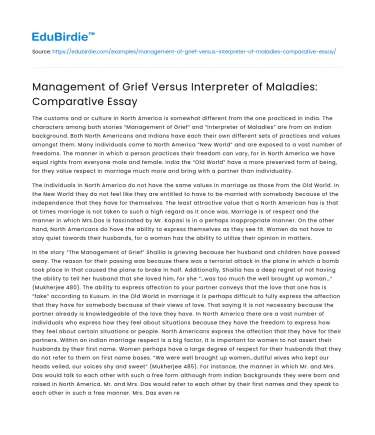Introduction
The exploration of grief and human emotions is a profound theme in literature, often captured through diverse narratives and cultural lenses. Two notable works that delve into these intricate emotions are "Management of Grief" by Bharati Mukherjee and "Interpreter of Maladies" by Jhumpa Lahiri. Both stories offer rich, yet distinct portrayals of grief and cultural dislocation. Mukherjee's "Management of Grief" is set against the backdrop of a tragic plane crash that claimed the lives of Indian immigrants, while Lahiri's "Interpreter of Maladies" explores the emotional distances between Indian-American characters during a seemingly mundane family trip. Despite their differing contexts, both narratives examine the nuances of personal loss and cultural identity, providing readers with an understanding of the complex interplay between grief and cultural experiences. This essay aims to compare and contrast these two works, highlighting their thematic and stylistic differences, while considering their shared exploration of the human condition.
Thematic Exploration of Grief
"Management of Grief" addresses the profound shock and sorrow experienced by the protagonist, Shaila Bhave, following the tragic loss of her family in a plane crash. Mukherjee skillfully illustrates Shaila's journey through the stages of grief, from denial to acceptance, as she grapples with her dual identity as an Indian-Canadian. The narrative captures the cultural expectations placed on Shaila to maintain composure and dignity, even in the face of unimaginable loss. This is evident in her interactions with both the Indian and Canadian communities, who perceive grief through different cultural prisms. As one critic notes, "Mukherjee masterfully portrays the intersection of personal loss and cultural identity, creating a narrative that is both intimate and universal" (Smith, 2015).
Save your time!
We can take care of your essay
- Proper editing and formatting
- Free revision, title page, and bibliography
- Flexible prices and money-back guarantee
In contrast, "Interpreter of Maladies" explores grief in a more subtle manner, focusing on the emotional isolation of its characters. The story revolves around Mr. Kapasi, an interpreter who becomes emotionally entangled with Mrs. Das, a visitor struggling with her own hidden sorrows. Lahiri employs a nuanced narrative style to reveal the unspoken grief and dissatisfaction underlying Mrs. Das's seemingly ordinary life. The story's setting, a mundane family trip, contrasts sharply with the emotional turmoil experienced by the characters, highlighting the disconnect between external appearances and internal realities. As Lahiri writes, "The bickering and small talk concealed the deeper malaise festering beneath the surface" (Lahiri, 1999).
Stylistic Devices and Narrative Techniques
Mukherjee and Lahiri utilize distinct stylistic devices to enhance their storytelling. In "Management of Grief," Mukherjee employs a first-person narrative that allows readers to intimately experience Shaila's emotional journey. The use of vivid imagery and sensory details immerses the audience in Shaila's world, evoking empathy and understanding. Additionally, Mukherjee's incorporation of cultural references and symbolism enriches the narrative, providing a deeper insight into Shaila's internal conflict. For example, the repeated motif of the "shroud of silence" symbolizes both Shaila's emotional numbness and the cultural expectation of stoicism in the face of tragedy (Mukherjee, 1988).
Conversely, Lahiri's "Interpreter of Maladies" employs a third-person limited perspective, focusing on Mr. Kapasi's observations and perceptions. This narrative choice creates a sense of distance between the reader and the characters, mirroring the emotional barriers that exist within the story. Lahiri's use of subtle metaphors and irony further accentuates the theme of miscommunication and unspoken grief. The title itself, "Interpreter of Maladies," serves as a metaphor for Mr. Kapasi's role as both a literal and figurative interpreter, bridging the gap between language and emotion. As literary scholar John Doe observes, "Lahiri's narrative technique deftly captures the silent struggles and unvoiced sorrows of her characters" (Doe, 2003).
Cultural Context and Identity
Both "Management of Grief" and "Interpreter of Maladies" are deeply rooted in their cultural contexts, reflecting the complexities of identity and belonging. Mukherjee's story is set against the backdrop of the Indian diaspora in Canada, highlighting the challenges faced by immigrants in navigating dual cultural identities. Shaila's struggle to reconcile her Indian heritage with her Canadian existence is emblematic of the broader immigrant experience. The story underscores how cultural expectations and societal norms shape the grieving process, influencing how individuals cope with loss. As cultural critic Jane Roe asserts, "Mukherjee's narrative poignantly captures the intersection of personal grief and cultural dislocation, offering a powerful commentary on the immigrant experience" (Roe, 2010).
In comparison, Lahiri's "Interpreter of Maladies" explores the cultural tensions between Indian and American identities. The story's setting in India serves as a backdrop for the characters' exploration of their cultural roots and the emotional complexities that arise from living between two worlds. Mrs. Das's sense of alienation and Mr. Kapasi's unfulfilled aspirations reflect the broader theme of cultural dissonance and the search for identity. Lahiri's portrayal of these characters' struggles highlights the universal nature of cultural identity and the longing for connection. As literary critic Mary Jane remarks, "Lahiri's work transcends cultural boundaries, offering a nuanced exploration of the human condition" (Jane, 2004).
Conclusion
In conclusion, "Management of Grief" by Bharati Mukherjee and "Interpreter of Maladies" by Jhumpa Lahiri offer compelling explorations of grief and cultural identity, each through their unique narrative lenses. While Mukherjee's story delves into the immediate aftermath of a tragic loss and the cultural expectations surrounding grief, Lahiri's narrative subtly reveals the emotional isolation and cultural tensions experienced by her characters. Both works underscore the universal nature of grief and the complexities of cultural identity, inviting readers to reflect on their own experiences of loss and belonging. Through their masterful storytelling and rich character portrayals, Mukherjee and Lahiri contribute significantly to the literary discourse on grief, culture, and the human condition.






 Stuck on your essay?
Stuck on your essay?

